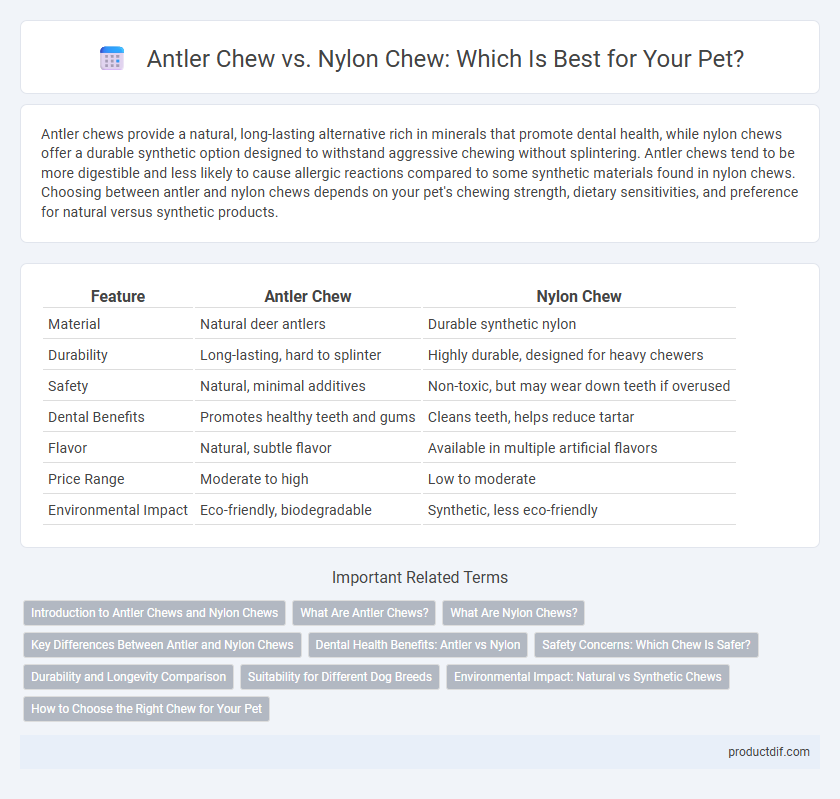Antler chews provide a natural, long-lasting alternative rich in minerals that promote dental health, while nylon chews offer a durable synthetic option designed to withstand aggressive chewing without splintering. Antler chews tend to be more digestible and less likely to cause allergic reactions compared to some synthetic materials found in nylon chews. Choosing between antler and nylon chews depends on your pet's chewing strength, dietary sensitivities, and preference for natural versus synthetic products.
Table of Comparison
| Feature | Antler Chew | Nylon Chew |
|---|---|---|
| Material | Natural deer antlers | Durable synthetic nylon |
| Durability | Long-lasting, hard to splinter | Highly durable, designed for heavy chewers |
| Safety | Natural, minimal additives | Non-toxic, but may wear down teeth if overused |
| Dental Benefits | Promotes healthy teeth and gums | Cleans teeth, helps reduce tartar |
| Flavor | Natural, subtle flavor | Available in multiple artificial flavors |
| Price Range | Moderate to high | Low to moderate |
| Environmental Impact | Eco-friendly, biodegradable | Synthetic, less eco-friendly |
Introduction to Antler Chews and Nylon Chews
Antler chews are natural, long-lasting treats derived from deer or elk antlers, offering high mineral content and durability ideal for aggressive chewers. Nylon chews are synthetic, designed to mimic bone texture with added flavors, providing a safer alternative for dogs prone to consuming wood or other harmful materials. Both types promote dental health by reducing plaque and tartar buildup while catering to different chewing preferences and dietary needs.
What Are Antler Chews?
Antler chews are natural dog chews made from shed deer antlers, known for their durability and nutritional benefits, including calcium and minerals. These chews are long-lasting, non-toxic, and ideal for aggressive chewers, promoting dental health by reducing plaque and tartar. Unlike synthetic nylon chews, antler chews offer a chemical-free, eco-friendly alternative that supports natural chewing instincts.
What Are Nylon Chews?
Nylon chews are durable pet toys made from synthetic polyamide designed to satisfy dogs' natural chewing instincts while promoting dental health by reducing plaque and tartar buildup. These chews come in various shapes, sizes, and flavors, providing long-lasting entertainment and helping to prevent destructive chewing behavior. Unlike natural antler chews, nylon chews offer a non-edible, consistent texture that is less likely to splinter or break apart.
Key Differences Between Antler and Nylon Chews
Antler chews are natural, renewable, and rich in minerals like calcium and phosphorus, providing a healthier alternative for dogs with strong chewing habits. Nylon chews are synthetic, designed to be highly durable and long-lasting, but may contain chemicals that can cause digestive issues if ingested excessively. Antlers offer a gritty texture that helps remove plaque, while nylon chews provide consistent density to satisfy aggressive chewers without splintering.
Dental Health Benefits: Antler vs Nylon
Antler chews provide natural minerals like calcium and phosphorus that promote healthy teeth and gums while being highly durable and less likely to splinter compared to traditional nylon chews. Nylon chews offer consistent texture for effective plaque removal and are designed to withstand aggressive chewing, but they lack the nutritional benefits found in antler chews. Both options support dental health by reducing tartar buildup, yet antler chews deliver added dental minerals that enhance oral hygiene naturally.
Safety Concerns: Which Chew Is Safer?
Antler chews, made from naturally shed deer or elk antlers, are generally safer due to their non-toxic, digestible composition and minimal risk of splintering compared to nylon chews, which can fracture into sharp pieces posing choking hazards or internal injuries. Nylon chews often contain synthetic chemicals and harder materials that may lead to dental fractures or gastrointestinal blockages if ingested in large chunks. Pet owners should evaluate the individual dog's chewing strength and monitor usage to prevent accidental injury regardless of the chew type.
Durability and Longevity Comparison
Antler chews offer exceptional durability due to their natural, dense composition, which resists splintering and lasts significantly longer than most nylon chews. Nylon chews provide moderate longevity but tend to wear down faster with aggressive chewers and may fracture over time. For pet owners prioritizing extended use and natural materials, antler chews represent a more durable and long-lasting option compared to synthetic nylon alternatives.
Suitability for Different Dog Breeds
Antler chews are ideal for aggressive chewers and larger dog breeds due to their durability and natural composition, which helps maintain dental health without splintering. Nylon chews suit a wider range of breeds, especially smaller to medium dogs, offering various textures and flavors to keep them engaged without excessive wear on teeth. Choosing between antler and nylon chews depends on the dog's chewing strength, size, and sensitivity to materials.
Environmental Impact: Natural vs Synthetic Chews
Antler chews are derived from naturally shed deer antlers, making them biodegradable and promoting sustainability through renewable sourcing. In contrast, nylon chews are synthetic products made from non-biodegradable plastics that contribute to environmental pollution and landfill waste. Choosing antler chews supports eco-friendly pet care by reducing plastic use and promoting natural decomposition.
How to Choose the Right Chew for Your Pet
Selecting the right chew for your pet involves considering factors like durability, safety, and your pet's chewing habits. Antler chews offer natural minerals and a long-lasting option that's less likely to splinter, suitable for aggressive chewers, while nylon chews come in various textures and flavors but may wear down faster and pose potential choking hazards if small pieces break off. Monitor your pet's chewing style and consult your veterinarian to ensure you choose a product that promotes dental health without compromising safety.
Antler Chew vs Nylon Chew Infographic

 productdif.com
productdif.com